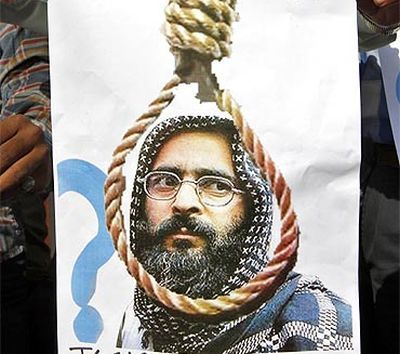 'If you are a Tamil-speaking Hindu convicted of terrorism, for murdering our prime minister, you are not hanged.'
'If you are a Tamil-speaking Hindu convicted of terrorism, for murdering our prime minister, you are not hanged.'
'If you are a Punjabi-speaking Sikh sentenced to die for assassinating a chief minister, you are not hanged.'
'If you are a Kashmiri-speaking Muslim accused of terrorism, you are hanged...'
'Afzal Guru was convicted of supporting the attack on India's Parliament. The Supreme Court said "the collective conscience of society will only be satisfied if capital punishment is awarded" to Guru.'
'Till we can think up similar justifications for hanging non-Muslims, I do not think we can delink terrorism from religion in our minds,' argues Aakar Patel.
Speaking in Malaysia last month, the prime minister said two things on terrorism. First, that it should be delinked from religion. Second, that it was the biggest threat the world faced. But is it?
The total number of Indians killed in acts of Islamist terror (outside of Kashmir) has been 21 this year. Last year it was 4. The year before that it was 25. The year before that it was 1.
500,000 Indian children under the age of 5 die of malnutrition every year. India's problem is that half of its population is poor, by any honest measure, and half is illiterate.
Is terrorism a bigger threat than climate change?
The prime minister himself accepts that the floods in Chennai are because of global warming. More than 280 people have died in these floods. So terrorism seems to me to be exaggerated as a problem.
It is a pressing issue in those countries of the West which have already sorted out the issues of poverty, malnutrition and illiteracy in great measure.
For them, terrorism is a sensational interruption to a life that is otherwise lived in comfort, unlike for the majority of Indians.
This piece is not about that, however. It is about that first claim made by the prime minister: That terrorism should be delinked from religion. So how can it be delinked?
Here are some facts.
If you are a Tamil-speaking Hindu convicted of terrorism, for murdering our prime minister, you are not hanged.
Three men, Murugan, Santhan and Perarivalan, were sentenced to die for assassinating Rajiv Gandhi and 14 others in a suicide bombing in 1991. Last year it was decided that they would not be hanged, and the Tamil Nadu government has been active in trying to get them freed.
If you are a Punjabi-speaking Sikh sentenced to die for assassinating a chief minister, you are not hanged. Balwant Singh Rajoana, who murdered then Punjab chief minister Beant Singh and 17 others in a suicide bombing, has not been hanged. This is even though Rajoana has demanded that he be killed and has even donated his organs.
Another Punjabi-speaking Sikh, Devindar Pal Singh Bhullar, has not been hanged for a 1993 assassination attempt on a Congress leader. A Sindhi and Gujarati-speaking Hindu who has been convicted of murdering 97 Gujaratis does not even have to spend time in jail. Maya Kodnani regularly gets bail and spends time outside prison despite being a convict.
If you are a Gujarati-speaking Muslim accused of terrorism, you are hanged, as Yakub Memon's family discovered. There were some who said he should not be hanged, but these were people who are opposed to capital punishment and they would oppose all hangings, including those of the people listed above. Memon got no support from Gujaratis.
If you are a Kashmiri-speaking Muslim accused of terrorism, you are hanged, as Afzal Guru's family discovered. It would be pointed out that in Guru's case the evidence may have been flawed, but this did not stop us from killing him.
There was enormous political pressure from the Tamil Nadu and Punjab assemblies to save the terrorists from their state. In Gujarat, of course, Kodnani was a minister of the government so not only was she seen with sympathy, her boss the chief minister (who is today the prime minister) has not said a word even to condemn her actions against fellow Gujaratis.
None of what I am saying here is new and everything is out in the open and on public record.
My question is, to go back to what we were discussing earlier: Is it honest and valid to claim that we should delink terrorism from religion? And if a leader wants to do this, what should his first steps be?
I would say it is difficult for anyone to do this, especially in our part of the world. As we have seen, it is not easy for us to see Hindu and Sikh terrorists as terrorists. Even when they are convicted, even when they use the same tactics of suicide bombing, and even when their actions kill innocent people along with their targets.
Afzal Guru was convicted of supporting the attack on India's Parliament. The Supreme Court said 'the collective conscience of society will only be satisfied if capital punishment is awarded' to Guru.
Till we can think up similar justifications for hanging non-Muslims, I do not think we can delink terrorism from religion in our minds.
IMAGE: A poster demanding capital punishment for Afzal Guru. He was hanged in Tihar jail in 2013 for his role on the December 13, 2001 attack on Parliament.
Aakar Patel is Executive Director, Amnesty International India. The views expressed here are his own.
You can read more of Aakar's columns here.











 © 2025
© 2025